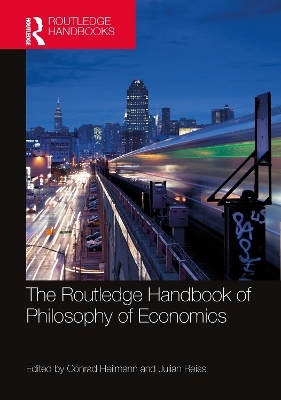
The Routledge Handbook of the Philosophy of Economics
Routledge (Verlag)
978-1-032-13163-4 (ISBN)
The most fundamental questions of economics are often philosophical in nature, and philosophers have, since the very beginning of Western philosophy, asked many questions that current observers would identify as economic. The Routledge Handbook of Philosophy of Economics is an outstanding reference source for the key topics, problems, and debates at the intersection of philosophical and economic inquiry. It captures this field of countless exciting interconnections, affinities, and opportunities for cross-fertilization.
Comprising 35 chapters by a diverse team of contributors from all over the globe, the Handbook is divided into eight sections:
I. Rationality
II. Cooperation and Interaction
III. Methodology
IV. Values
V. Causality and Explanation
VI. Experimentation and Simulation
VII. Evidence
VIII. Policy
The volume is essential reading for students and researchers in economics and philosophy who are interested in exploring the interconnections between the two disciplines. It is also a valuable resource for those in related fields like political science, sociology, and the humanities.
Conrad Heilmann is Associate Professor of Philosophy at Erasmus School of Philosophy, Co-Director of the Erasmus Institute for Philosophy and Economics (EIPE), and Core Faculty of the Erasmus Initiative Dynamics of Inclusive Prosperity at Erasmus University Rotterdam, The Netherlands. He works on rational choice theory, fairness, finance, and other topics in the philosophy of economics. Julian Reiss is Professor of Philosophy at Johannes Kepler University Linz, Austria, and Head of the Institute of Philosophy and Scientific Method. He is the author of Causation, Evidence, and Inference (Routledge, 2015), Philosophy of Economics: A Contemporary Introduction (Routledge, 2013), Error in Economics: Towards a More Evidence-Based Methodology (Routledge, 2008; Erasmus Philosophy International Research Prize), and more than 60 papers in leading philosophy and social science journals and edited collections.
1. Introduction 2. History of Utility Theory 3. The Economics and Philosophy of Risk 4. Behavioral Welfare Economics and Consumer Sovereignty 5. The Economic Concept of a Preference 6. Economic Agency and the Subpersonal Turn in Economics 7. Game Theory and Rational Reasoning 8. Institutions, Rationality, and Coordination 9. As If Social Preference Models 10. Exploitation and Consumption 11. Philosophy of Economics? Three Decades of Bibliometric History 12. Philosophy of Austrian Economics 13. Representation 14. Finance and Financial Economics: A Philosophy of Science Perspective 15. Values in Welfare Economics 16. Measurement and Value Judgements 17. Reflections on the State of Economics and Ethics 18. Well-Being 19. Fairness and Fair Division 20. Causality and Probability 21. Causal Contributions in Economics 22. Explanation in Economics 23. Modeling the Possible to Modeling the Actual 24. Experimentation in Economics 25. Field Experiments 26. Computer Simulations in Economics 27. Evidence-Based Policy 28. Economic Theory and Empirical Science 29. Philosophy of Econometrics 30. Statistical Significance Testing in Economics 31. Quantifying Health 32. Freedoms, Political Economy, and Liberalism 33. Freedom and Markets 34. Policy Evaluation Under Severe Uuncertainty: A Cautious, Egalitarian Approach 35. Behavioral Public Policy: One Name, Many Types. A Mechanistic Perspective 36. The Case for Regulating Tax Competition
| Erscheinungsdatum | 28.09.2023 |
|---|---|
| Reihe/Serie | Routledge Handbooks in Philosophy |
| Zusatzinfo | 11 Tables, black and white; 15 Line drawings, black and white; 15 Illustrations, black and white |
| Verlagsort | London |
| Sprache | englisch |
| Maße | 178 x 254 mm |
| Gewicht | 453 g |
| Themenwelt | Wirtschaft ► Allgemeines / Lexika |
| Wirtschaft ► Volkswirtschaftslehre | |
| ISBN-10 | 1-032-13163-2 / 1032131632 |
| ISBN-13 | 978-1-032-13163-4 / 9781032131634 |
| Zustand | Neuware |
| Informationen gemäß Produktsicherheitsverordnung (GPSR) | |
| Haben Sie eine Frage zum Produkt? |
aus dem Bereich


